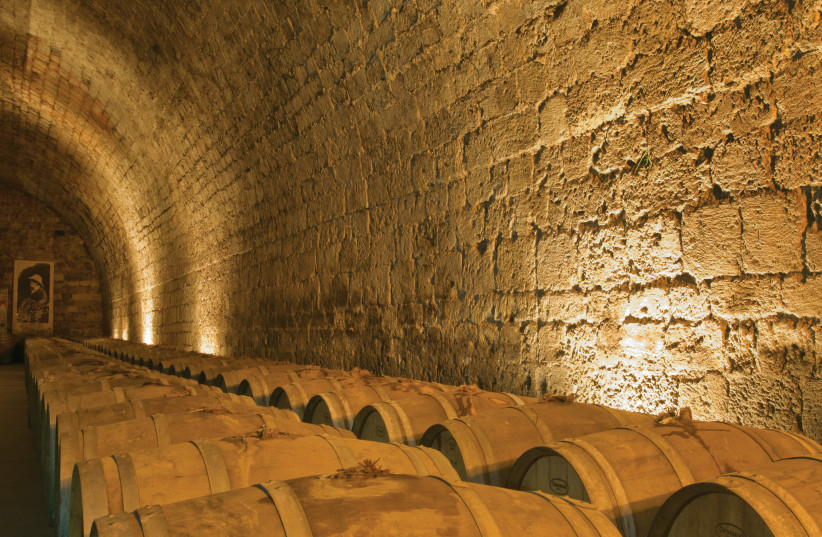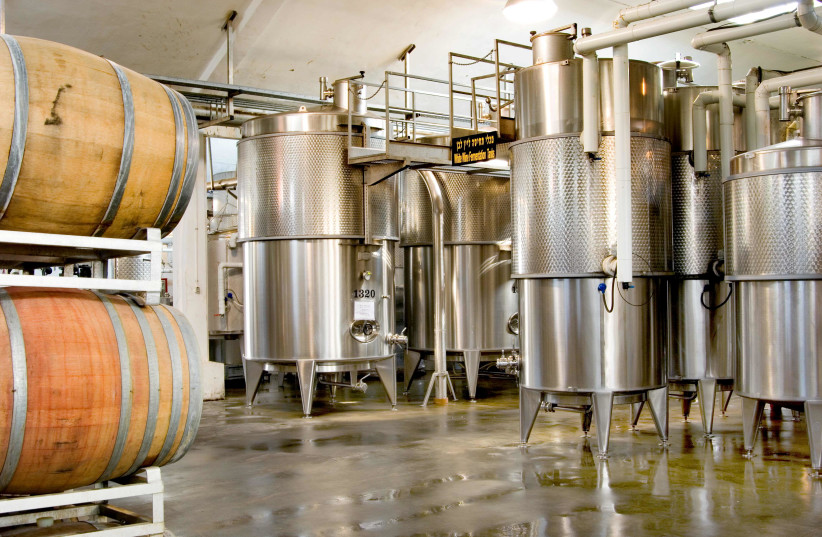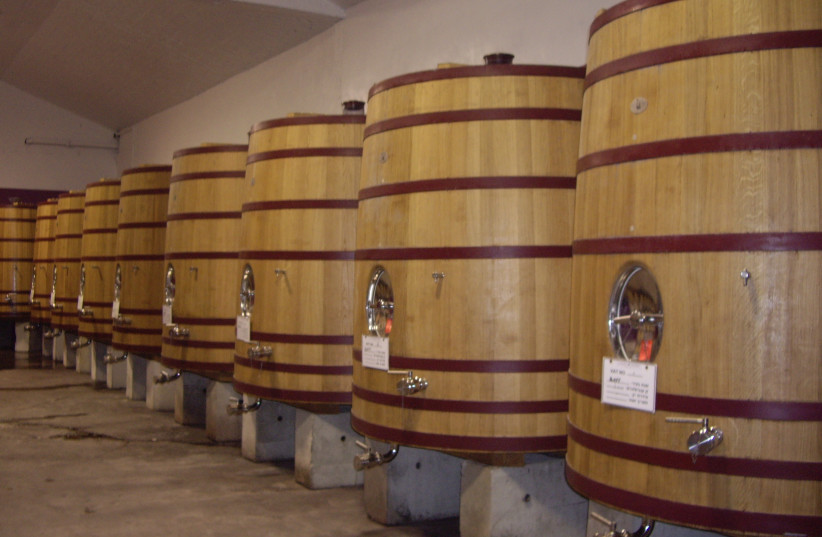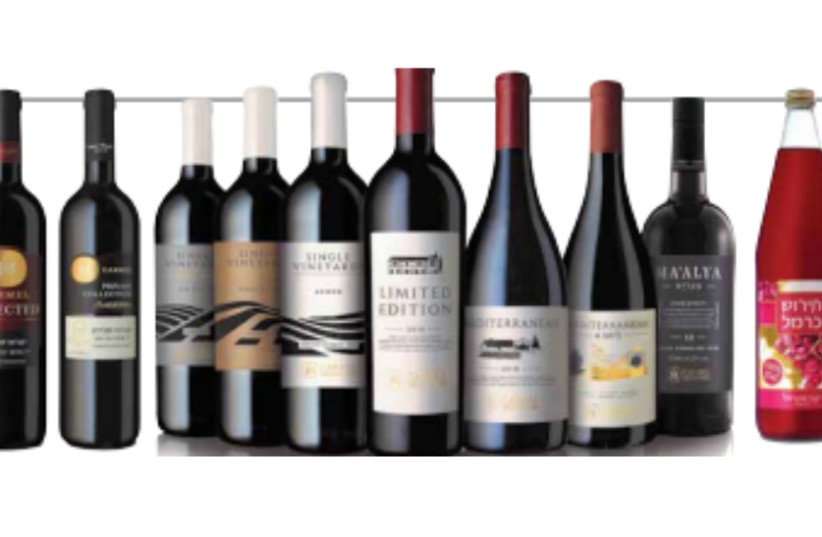Any student of Zionism, or wine lover, knows Carmel Winery was founded by Baron Edmond de Rothschild in 1882. Lest we forget, just look at the winery’s logo. The founding of the future winery towns of Rishon Lezion and Zichron Ya’acov was in that particular year, but it was also when the first experimental vineyards were planted.
Carmel’s first winery, Rishon Lezion Cellars, was established only in 1890 and the first time the brand name “Carmel” was used was not until 1896, and that was initially for an export marketing company. The root of the word is Kerem-El, God’s vineyard. Of course, the founding of a winery usually dates from the first harvest or when the first wines are launched. In this case, it was when the very first vines were planted. Agudat Hacormim (the wine growers cooperative), registered in French as “SCV des Grandes Caves”, was founded in 1906.
The founding of Carmel heralded the revival of a Jewish Israeli wine industry after 2,000 years. The company became known as “Carmel Oriental” within the Ottoman Empire and “Carmel Wine Co.” in export markets. When Hebrew became more commonly used, the Oriental was translated to Mizrahi, and “Carmel Mizrahi” was born!
The rich history of Israel's Carmel Winery
No one can dispute that it is the historic winery of Israel. It was founded by Baron Edmond de Rothschild, owner of Chateau Lafite, with French expertise. The winery was the first place in Israel to use electricity and the telephone, and three future prime ministers, including David Ben Gurion, would work there.
Carmel has made wine under the auspices of the Ottoman Empire, the British Mandate, and the State of Israel, never missing a harvest during World Wars, local wars, intifadas, suicide bombings, and all sorts of distractions peculiar to Israel. For over 100 years, Carmel simply was Israeli wine. It kept the Israel wine industry afloat during all the ups and downs of building a state.

By the 1990s, Carmel Mizrahi was very strong in the mass market, and because of its market share, was quite high profile in the quality market. However, the wines in terms of quality, fruit, and flavor, were way behind those of the Golan Heights Winery and the new small wineries.
At the beginning of the 2000s, root canal treatment was required to rehabilitate the image of the company. Peter Stern, the legendary Californian wine consultant (ex-Golan Heights Winery), was employed. Vineyards were planted in the Upper Galilee, new young winemakers were taken on, small wineries built, large wineries were refurbished, and existing cement tanks were renewed. Yatir Winery, which became a wholly-owned subsidiary, was founded.
Carmel led the way in two ways, now forgotten. It was the first winery to introduce the concept of a single vineyard “first label” and regional wines “second label” and was the first larger winery to focus on Mediterranean varieties and blends. Carmel founded Handcrafted Wines of Israel, a consortium of some of Israel’s finest wineries (including Castel, Flam, Margalit, Tzora and Yatir) and The Center for Wine & Culture, at the time an innovative fusion of wine tourism and wine education.
THE BIGGEST change was the quality. Third party recognition catapulted Carmel into a totally different place, image wise. The Kayoumi Cabernet Sauvignon 2003 and 2004 won the Gold Medal at the Eshkol Hazahav Competition two years in a row. This was the first heads up in what was then the most demanding and competitive category. In local competitions, Carmel excelled. If anyone was in any doubt, Carmel was in a different place.
Internationally, the success bordered on the sensational. Yatir Forest 2003 was the highest scoring wine in the milestone first ever tasting of influential American critic Robert Parker’s Wine Advocate. At the time, this was the highest score from any Israeli, Kosher or Eastern Mediterranean winery.
Then, the icing on the cake – Carmel Kayoumi Shiraz 2006 became the only Israeli wine ever to win The International Trophy at the Decanter World Wine Awards, arguably the best award ever for an Israeli wine. The flagship Limited Edition was regarded as Carmel’s finest wine since the legendary Special Reserve of 1976. Howard Goldberg of the New York Times, doyen of wine critics, thought it was the best Israeli wine he had ever tasted.
Carmel had succeeded in putting the “winery” back into Carmel Mizrahi, and sure enough, in 2004, the company name in use was changed to Carmel Winery. However, though its image was rehabilitated, there was a business to run. Israeli wine had changed. There were by now no less than 13 Israeli wineries producing over a million bottles a year, and over 300 small wineries.
Carmel was making wine in old, expensive to run premises, and was still held in thrall to the banks. Carmel took the first steps for the future by consolidating production. The last harvest received at Rishon Le Zion Cellars was in 2010, which was then closed as a winery after 120 years. By the next year, all production had been transferred to Zichron Ya’acov Cellars.
Salvation was at hand. In 2013, Kedma Capital, with a consortium of Israeli and overseas investors, purchased Carmel Winery. Those of us who expected immediate clarity of purpose were disappointed. During the first five years, the company trod water as the Israeli wine world around them advanced.
It did not help that there were five CEOs in six years. Some of them were incredibly unsuited for the task in hand. Many of the benefits earned in the early 2000s were squandered. Barkan-Segal even took over as the largest winery.

THERE WERE some changes, however. A new logistics center, bottling plant, and winery were opened at Alon Tabor and offices were opened in Shoham. Nevertheless, in 2018, a new management and new direction took root. Now looking back with hindsight five years later, I am pleased to report there was leadership, strategy, and most importantly, results.
Nadav Arens-Arad was appointed CEO. He was an ideal choice who ticked all the boxes. He was born into a family of grape growers and spent 22 years of his business career in the Strauss Group, cumulating in being CEO of Strauss Coffee for seven years.
Both he and his father had served on the board of Agudat Hacormim for many years. He was the right man in the right place, as it were. He had one foot in the grand world of business, one foot in the wine bubble, and was totally at home in the parochial wine village of Agudat Hacormim. He gathered around him a new management team.
Yossi Edri, a human dynamo and pusher, became VP of Sales and Business Development. He came with a background of 15 years with Tempo Beverages. He has recently been appointed Deputy CEO. He is a bulldozer and accordingly, a great deal of Carmel’s success is due to him.
Ran Assa joined Carmel as Category Brands Manager, and was swiftly promoted to Marketing Manager. He had experience of wines, spirits and beers. He is painstakingly thorough, knowledgeable and professional. I see his calm well researched approach in many of the decisions.
The winemaker also changed. Yiftach Perets graduated in Italy, cut his teeth at Carmel, and returned home to manage Carmel’s winemaking team. He is creative and practical, and is wisely steering the vineyards and winery towards a profitable future.

The person pulling them all together is Arens. He is a real manager, a good listener, and a team player. I have been around a long time and have first-hand experience of some of the giant CEOs of our business, but I have also seen a few of the worst. No doubt, Arens is the CEO that Carmel deserves.
THE FIRST thing they did was change labels. This is the knee jerk reaction of all new managers, normally in unsuccessful wineries. However, this time, there was a strategy. They upgraded the logo and changed the hierarchy of the labels, with the company name proudly on top and introduced this consistency vertically throughout the range in the mass market.
They also carefully researched the market and realized that no less than 90% of all sales are for wines under NIS 40. So, the early part of their campaign was geared to creating order in this sector, which is massively important to Carmel.
Their main brands in the mass market are Buzz, Selected, Private Collection, and Appellation. “Selected” alone has a 50-year history. Today, it has made a comeback. It is Israel’s largest selling brand and Selected Cabernet Sauvignon is the largest selling wine. Buzz, Selected and Private Collection, added to the iconic Carmel Tirosh grape juice, are the engine room of modern-day Carmel.
For five consecutive years since 2018, Carmel has shown increasing growth, with an ever-bigger gap between it and its competitors. Carmel proudly regained its rightful place as Israel’s largest winery, a position it had only relinquished for a few years.
Carmel then focused on the upper-level wines. All the labels were changed or updated, even the wines with worldwide recognition like Limited Edition and Mediterranean. That was a brave move. The Single Vineyard label was changed for the fifth time in 15 years, but the new design was bold, very different, and represented an innovative approach. All were grouped together under a new umbrella heading “Carmel Signature.”
AT THE same time, Carmel continued to diversify and grow its distribution business. It took on the wines of Vitkin Winery to market alongside Yatir, and went into beer, representing Israeli craft breweries Jems and Alexander, as well as the German brewery Krombacher. Carmel also returned to spirits, particularly with the outsourced Carmel Arak and brandies.

In 2022, the final piece in the grand plan fell into place. Carmel Winery merged with Clal Beverages to form Carmel Corp., and the company went public. The future plans are to continue to develop the Alon Tabor facility, to be the fully-fledged winery able to cope with all Carmel’s needs.
Thankfully, Zichron Ya’acov Cellars will be preserved as a small winery for the top labels, and developed as a visitors’ center and tourist facility. Founded in 1892, it remains Israel’s oldest winery building and factory, still in use. It should be regarded as a national treasure.
I had the privilege to write the English version of the album 120 Harvests, which outlined an incredibly rich history. Carmel is an integral part of the story of Israel and represents the Zionist dream come true.
Maybe the cooperative protected Carmel during its long past. However, now we are in the 21st century, I get the feeling Carmel Winery has found it voice and its place in Carmel Corp. and that this is the best way to preserve this very important company’s future.
Carmel has chosen a back-to-basics approach, preferring practicality to delusions of grandeur. The winery’s excellent performance at the recent Best Value, Eshkol Hazahav and the Decanter WWA competitions, show good times are here again.
Its return and revival are beautiful to behold. Even though Carmel has made wine in three separate centuries, this winery has never really been away.
Long may it continue!
The writer is a wine industry insider turned wine writer, who has advanced Israeli wines for 35 years. He is referred to as the English voice of Israeli wine. www.adammontefiore.com
